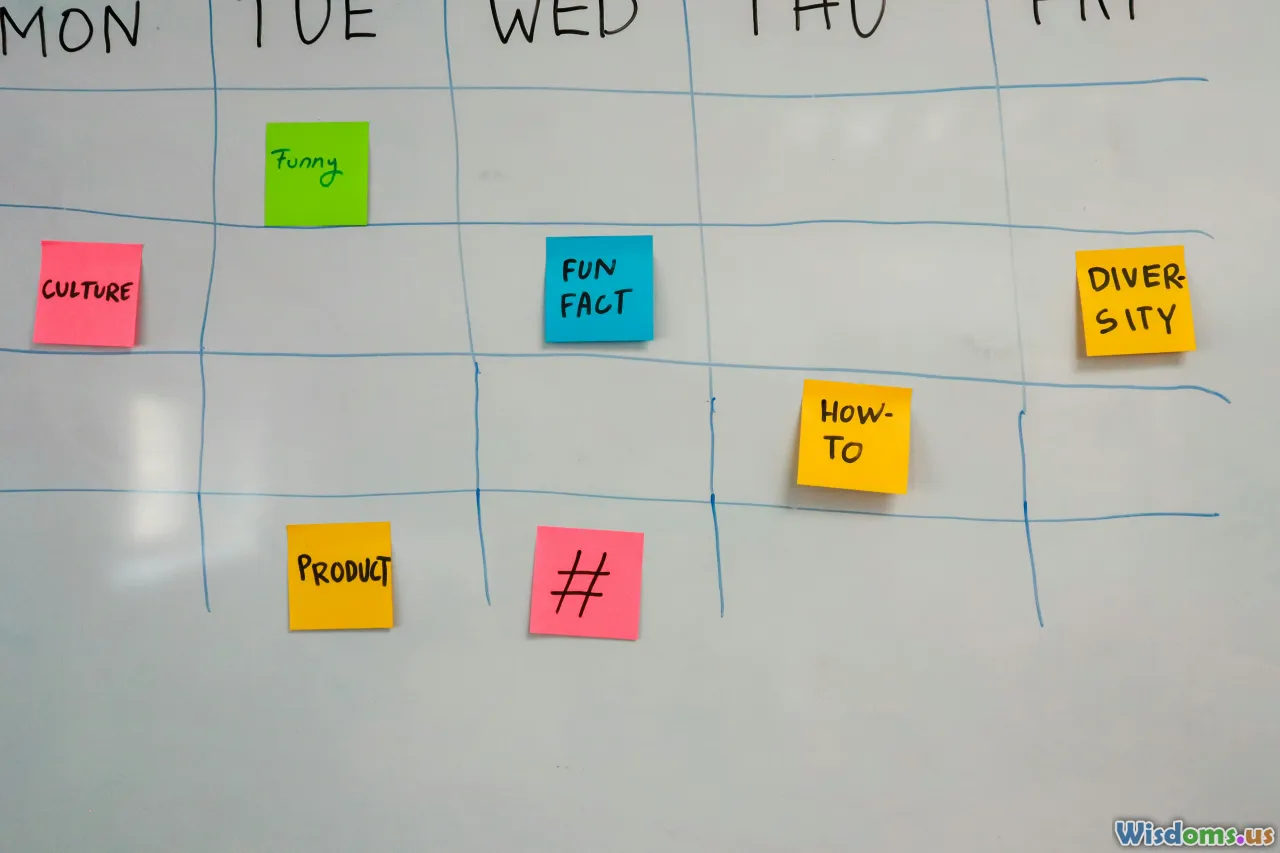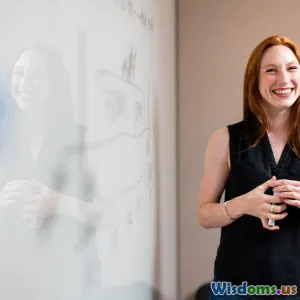
Real Stories Effective Career Plans that Inspired Change
13 min read Explore real-life stories of individuals who transformed their careers with actionable, effective planning strategies that brought about lasting change. (0 Reviews)
Real Stories: Effective Career Plans That Inspired Change
A thriving career rarely unfolds by chance—behind every inspiring climb lies strategic decisions, moments of clarity, and an actionable plan. While buzzwords like "career mapping" and "goal setting" abound, what truly distinguishes transformative career plans are the lived experiences and new choices individuals make. Here, we draw on real stories and practical takeaways, illustrating how purpose-driven career planning not only propels success but also ignites change in individuals, teams, and whole industries.
Discovering Purpose: From Burnout to Meaningful Impact

Sometimes, a career plan emerges from an urgent need to find meaning or escape burnout. Consider the case of Priya, a former corporate consultant in Mumbai. After five years of late nights, grueling travel, and little personal time, Priya found herself questioning the impact and purpose of her work.
Rather than succumbing to disillusionment, she chose to clarify her values, asking herself what problems she truly wanted to solve. With the help of a professional coach, Priya underwent a process of self-discovery:
- Journaling values and interests.
- Interviewing professionals in her aspirational fields.
- Assessing her strengths beyond her current job.
Priya soon realized her true passion was in healthcare technology, specifically in making healthcare accessible in rural India. She designed an actionable plan: enroll in a health tech bootcamp, volunteer with a telemedicine NGO, and set a timeline to transition roles. Two years later, Priya was leading projects that delivered tangible healthcare outcomes in underprivileged areas.
Takeaway: Priya's journey shows that burnout can often signal it is time for re-alignment—and that career clarity arises from reflection followed by defined, experimental steps.
Structured Change: Moving from Analysis to Action

Meticulous planning and execution can transform even the most daunting career leaps into achievable goals. Look at the example of José, who spent a decade as a mid-level manager in a logistics company in São Paulo. Though admired for his organizational skills, José longed to move into data analytics—a field with better prospects and larger impact.
José charted a roadmap over 18 months:
-
Skill Audit: He appraised which analytics tools and concepts he needed but lacked.
-
Learning Mode: José took free online courses in Python and data visualization tools on weekends.
-
Micro Projects: He volunteered for cross-departmental teams handling operational data for supply chain optimization.
-
Networking: He attended monthly meetups and reached out on LinkedIn to data professionals for insight.
-
Visibility: José started sharing “before/after” case studies of the company’s logistics data dashboards on an internal blog.
Eventually, José secured an internal transfer to the analytics team—thanks largely to the micro-projects that combined self-learning with real company outcomes.
Actionable Tips:
- Break down your upskilling into daily or weekly micro-goals.
- Use your current role to demonstrate new skills before asking for a formal switch.
- Find or create mentors in aspirational roles and seek candid feedback.
Navigating Setbacks: Reinvention Through Resilience

Career paths rarely follow linear trajectories—setbacks or layoffs may strike unexpectedly. Claudia, once a rising marketing executive in Berlin, faced a sudden corporate downsizing. Instead of viewing unemployment as a defeat, she reframed it as a pivot point.
Claudia:
- Took a career break to reflect and recuperate.
- Sought feedback from former colleagues on her most impactful work.
- Explored gig roles in analytics and social media that played to her strengths.
By treating her layoff as a platform to experiment, Claudia uncovered a zeal for behavioral analytics. She built a portfolio of projects, landing freelance contracts, and eventually a hybrid role aligning marketing with behavioral science.
Insight: Career disruptions are often catalysts for growth—by viewing them as launching pads, many people like Claudia craft unexpected, rewarding new chapters.
Community and Collaboration: Harnessing Collective Momentum

No transformational career plan develops in a vacuum. In 2019, a group of engineers at a European aerospace company grew frustrated with a lack of innovation. Rather than polish up CVs and move on, they banded together.
This internal community:
- Organized peer-led workshops on emerging technologies.
- Invited guest speakers to inspire team-wide skill development.
- Launched a pilot intrapreneurship program that allocated time to internal innovation challenges.
Their efforts resulted in:
- A 30% increase in patent filings within two years.
- Recognition and resources for the team, spawning new leadership opportunities.
- A company-wide commitment to bottom-up innovation.
Analysis: Group-led career advancement magnifies impact and builds collective skills. Whether inside a company or among external networks, collaborative initiatives accelerate change for all participants.
Bold Changes: Switching Sectors and Giving Back

True career fulfillment sometimes involves leaving comfort zones. After 15 years in senior finance roles in New York, Michael reevaluated his contribution to society. Contemplating greater purpose, he mapped out a plan:
- Identifying transferrable skills such as budgeting, governance, and project management.
- Researching non-profit organizations focused on youth education.
- Volunteering as a pro bono financial adviser to a charity for six months.
- Enrolling in a social-enterprise management course.
Michael ultimately joined a non-profit as Chief Operations Officer, leveraging his corporate know-how to double donor engagement. He later began mentoring professionals seeking purpose-driven work.
Lessons:
- Find your next "sector" by assessing core skills and passions—not just job titles.
- Use volunteering and short courses as testbeds for fit before major moves.
Digital Transformation: Cultivating New Skills in the Age of AI

Modern career planning increasingly means futureproofing your skills. Lina, an educator in Manila, glimpsed the rise of artificial intelligence (AI) in online teaching. Rather than resist technological change, she saw opportunity:
- She enrolled in MOOCs (Massive Open Online Courses) on AI in education.
- Piloted AI-driven tutoring tools in her classrooms.
- Documented successes and challenges, sharing them in webinars and on her blog.
- Built a personal brand as an "ed-tech innovator," which led to consultation opportunities and an international conference invitation.
What to Learn:
- Stay curious about tools reshaping your domain.
- Start with small, low-risk experiments—but always track and publish results.
- Embrace lifelong learning to remain indispensable and inspiring.
Navigating Constraints: Career Plans Amid Personal Challenges

Sometimes ingenuity shines brightest amid personal or logistics complexities. Maya, a project manager based in Nairobi, found her on-site work incompatible with new family needs. Rather than giving up on her ambitions, Maya managed to negotiate remote project oversight by:
- Upgrading her home office tech setup.
- Establishing clear KPIs and communication norms with her team.
- Demonstrating heightened productivity and ownership to skeptical managers.
By showcasing superior outcomes over six months, she laid the groundwork for future flexible work accommodations company-wide.
Advice:
- Frame flexibility not as a personal ask, but as an innovation with measurable benefits.
- Use the opportunity to pioneer systems that benefit others in similar situations.
Giving Back: From Corporate Ladder to Social Enterprise

After two decades as a product manager for global brands, Elena felt compelled to redirect her expertise toward impact-driven work. She co-founded a social enterprise to mentor women in STEM across Eastern Europe.
Steps included:
- Building a network of mentors across her professional contacts.
- Partnering with tech companies to provide learning materials and role-shadowing.
- Running career-readiness bootcamps for university graduates.
The venture now supports over 300 young women each year—and Elena continues to consult for corporates seeking to amplify their CSR (Corporate Social Responsibility) efforts.
Key Insight: Large-scale change is magnified when skills and connections are redirected to serve causes larger than oneself. Mentorship, in particular, multiplies positive outcomes—both for the mentor and mentee.
Crafting Your Own Path: Practical Steps Inspired by These Stories

Drawing on real stories, it’s clear that effective career planning is equal parts strategy and heart. If you seek transformative growth in your own journey, consider these actionable steps:
- Audit your values and strengths: Write them down. What energizes you? What comes easily—even if you discount it?
- Use micro-experiments: Volunteer, take on projects, or participate in bootcamps before making a big leap.
- Network with intention: Reach out to those who have made changes you admire; ask concrete questions.
- Document and reflect: Keep a journal or portfolio of the work and outcomes you are most proud of.
- Plan for setbacks: View them as data, not roadblocks. What can you adapt or adjust?
- Share your journey: Helping others find clarity often brings your own into sharper focus.
From bold pivots to incremental adjustments, these stories reveal there is no singular right path—only the one most authentic and actionable for you. Take inspiration from those who have turned their strategic career plans into real-world change, and harness those lessons to fuel your next step forward.
Rate the Post
User Reviews
Popular Posts


















